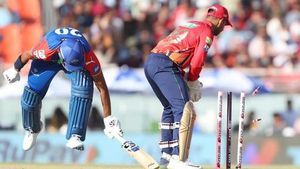Australian cricket legend Ian Chappell has called time on his career in journalism after 52 years. The 81-year-old played his last game of professional cricket in 1980, but has long been known as one of cricket’s most iconic broadcasters and writers since then. On Sunday, the former Aussie Test captain announced he was penning his “last column.”
“In my playing days I asked former Australia captain Richie Benaud if retirement was a difficult decision. ‘No Ian,’ Benaud replied wisely, ‘It’s easy. You’ll know the right time’,” Chappell wrote for ESPNcricinfo. “Always astute, Benaud was correct. Retirement from journalism is similar to cricket — I knew the time was right.”
Following his playing career, Chappell formed part of an iconic Australian broadcasting team alongside Benaud, Bill Lawry, and Tony Greig. The legendary quartet narrated Australian cricket for over three decades, covering the sport during some of its greatest eras. Chappell was best known for his forthright and candid opinions, not shying away from being honest about performances.
While he is best remembered for his television career, his writing remained the constant throughout his career. “Talented magazine and later website owner Eric Beecher gave me my first writing job in 1973,” Chappell wrote on Sunday. “He later organised a meeting with Graham Perkin, the editor of The Age, who contracted me to write for the newspaper.”
Reflecting on the history of his writing, Chappell said, “When we first met, Perkin asked if I’d like a ghost writer. I said I’d like to write my own stuff for six weeks and he could then judge. I never heard from Perkin, so I wrote all my own pieces.
Chappell expressed heartfelt thanks to his bosses of more than two decades, Clayton Murzello of Mid-Day and Sambit Bal from Cricinfo, who he said gave him free rein and encouragement. “For around 40 years I’ve been writing on a computer. The improvement over using a typewriter is mainly the ease of being able to cut and paste,” he explained. “It’s a big advance on having to discard, then rewrite copy paper.”
Yet, he acknowledged it was time to close this chapter of his life. “I wish each and every one who has helped and befriended me along the way all the best in their future endeavours,” Chappell concluded.
His illustrious writing career also included several cricket books, and he noted his last book, Chappelli: Life, Larrikins and Cricket, was the one from which he derived the most satisfaction. Throughout his career, Chappell had the unique ability to convey not just facts but emotion and storytelling, which kept readers and viewers engaged.
Chappell’s illustrious cricket career included making his Test debut against Pakistan in 1964, amassing 5,345 Test runs across 75 matches, placing him among the greats. He served as captain for 30 matches and left behind a legacy as both player and commentator. He was inducted to multiple halls of fame, including the Sport Australia Hall of Fame and Australian Cricket Hall of Fame, reflecting on the significant mark he made on the sport.
Tributes have poured in from cricket fans and pundits following the announcement of his retirement. Many expressed sorrow at the end of his writing career but more celebrated the extensive impact he had during his time as a journalist. Fellow writer Rex Clementine noted, “Ian Chappell, could have easily relied on a ghostwriter for his columns. But he chose to craft them himself. His sharp, insightful writing will be missed.”
Another homage via social media was from former cricketer Sanjay Manjrekar who highlighted the emotional resonance of the moment and the loss of his insights.
Indeed, Chappell’s writing defined astute observation paired with wit and will be missed. Irreplaceable as he once was, he began his career shortly after completing his tenure as captain. His insights gave contemporary cricketers and fans cherished perspectives on cricket’s evolution and history.
Chappell's decision to retire marks the end of an era for cricket journalism. For over five decades, he not only witnessed the sport’s transformation but also documented it with unparalleled passion and authenticity. Chappell’s career is not just defined by runs scored but by narratives crafted and memories encapsulated. While he may be retiring from the keyboard, his contributions will echo through the backdrop of cricket forever.



